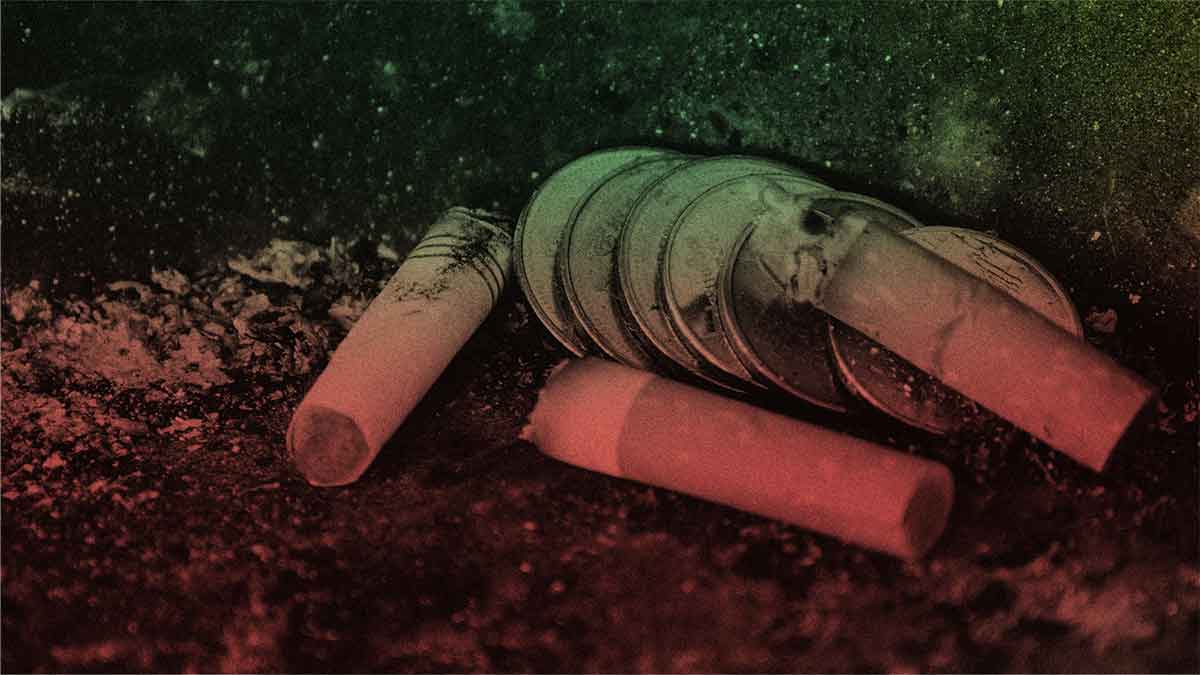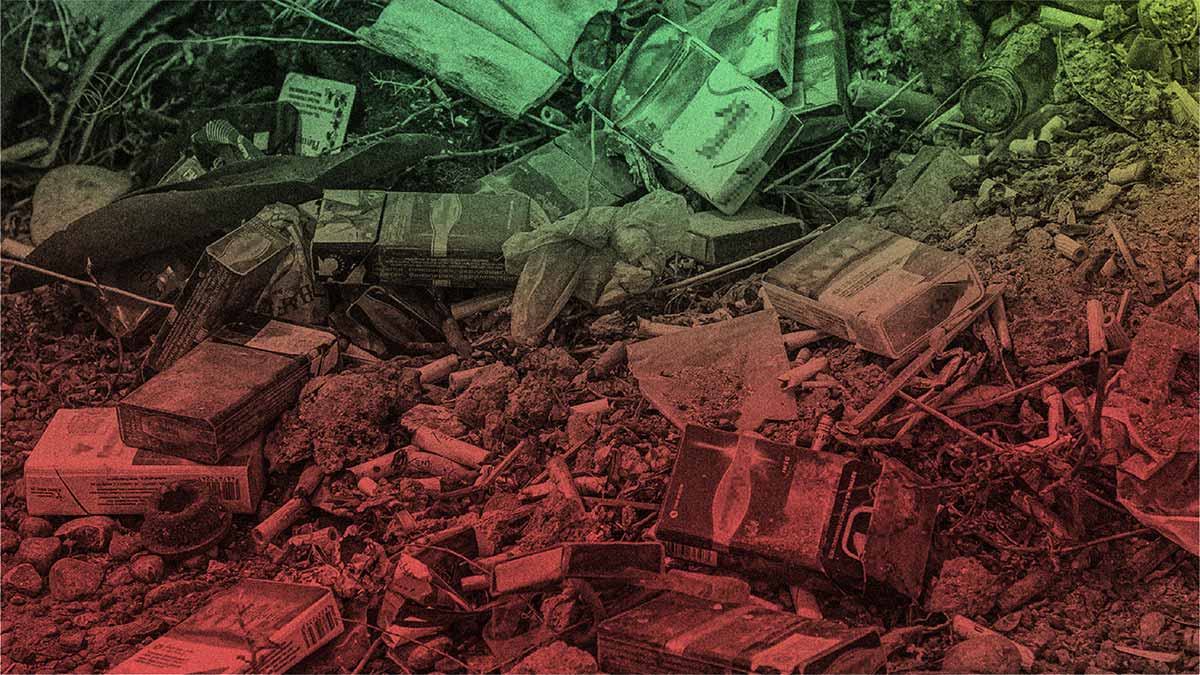- Resources
- News
-
-
Get Email Updates
Sign up for STOP's emails and never miss an update on our latest work and the tobacco industry's activity.
-
Get Funding
Ready to tackle industry interference? You could be eligible for a grant.
-
Share a Tip
Do you have information on tobacco industry misconduct in your country? Let us know.
-
Get Email Updates

A single year of tobacco industry operations leaves a trail of damage in its wake: 600 million trees chopped down, more than 80 million tonnes of carbon dioxide equivalent emitted, 4.5 trillion cigarette butts discarded. All to continue selling addictive products that, unlike some other polluting products, bring no benefit to people—only disease and death.
As the world’s largest tobacco companies continue to earn billions in profit year over year, people and governments are left to deal with the health and environmental consequences of its operations.
Tobacco companies can be made to pay for the harms they cause, and as the climate crisis worsens, there’s never been a better time to hold them accountable than now. Fortunately, there’s an existing framework that can help make that happen.

It’s time to demand the industry be held accountable for the environmental destruction it causes.
What is the “polluter pays” principle?
“Polluter pays” is a broad principle enshrined in international environmental law aimed at making polluters pay for the cost of their environmental harms. In practice, this has come in the forms of clean-up cost reimbursements and special ecotaxes or levies on harmful products, among others.
Extended producer responsibility (EPR)—another way of holding polluting industries accountable—applies the polluters pay principle by putting the producer of a polluting product in charge of ensuring the product can be responsibly disposed of. EPR legislation, for example, has been introduced for the paint industry in the United States. EPR programs may put a given industry in charge of ensuring proper disposal, which can lead to self-regulation and partnerships with government departments, such as ministries of environment. History has shown, however, that the tobacco industry cannot be trusted to self-regulate and countries that are Parties to the World Health Organization Framework Convention on Tobacco Control (WHO FCTC) are obligated to avoid partnerships with the tobacco industry. For those reasons, an EPR policy that allows the tobacco industry to project itself as “responsible” would undermine the WHO FCTC, instead of holding the tobacco industry accountable for the environmental damage it and its products cause.
Applying the “polluter pays” principle to the tobacco industry
The tobacco industry has already been called on to pay for the harms it’s perpetuated throughout the COVID-19 pandemic. Now it’s time to demand the industry be held accountable for the environmental destruction it causes.
An excellent opportunity to apply this principle is with a problem that affects all of us: cigarette butt litter. The burden of this litter is immense, in costs incurred by governments trying to clean it up and in damage caused to the environment.
Cigarette butts are the most littered item on the planet. They’re more than unsightly. Most commercial cigarette filters contain single-use, nonbiodegradable plastic and toxic chemicals. Many cigarette butts end up on beaches and in waterways, where they may be eaten by wildlife or leach toxic chemicals into the rivers, lakes and oceans they settle in, contaminating water and potentially food sources.
For too long, the blame for cigarette butt waste has been placed on consumers and the responsibility of cleaning it up has been put on communities and governments who must physically and financially bear the burden of safe disposal. Some tobacco companies fund clean-up efforts as part of their “greenwashing” activities. But community clean-ups alone will never come close to meaningfully reducing the number of toxic cigarette butts in the environment. And governments should not have to spend taxpayer money that could be used for other necessities cleaning up cigarette litter.
This is where the polluter pays framework, consistent with the WHO FCTC, can make a meaningful difference. In addition to reducing the number of cigarettes smoked, via smoking bans and other proven tobacco control measures, governments can reduce the burden of this litter by charging “ecotaxes” on cigarettes. Some countries that are already enacting measures to address plastic pollution, such as those in the European Union, could include these taxes as part of new regulations relating to plastics. These taxes, added onto existing tobacco taxes, can reimburse governments for the funds spent on cigarette butt litter clean-up. Guidelines for Article 6 of the WHO FCTC offer a framework for dedicating taxes to health promotion, and could be used as a model for dedicating additional “ecotaxes” to litter disposal.
Other ways to hold the industry accountable
Governments may also use litigation to help recover some of the costs associated with tobacco-caused environmental damage. Article 19 of the WHO FCTC addresses holding the industry liable for damages, including compensation where appropriate. This compensation could help reimburse those who’ve been directly affected by not only harms caused from cigarette litter, but deforestation, water contamination, pollution and more. Oluwafemi Akinbode of Corporate Accountability and Public Participation Africa noted in a recent webinar on tobacco industry greenwashing that litigation against oil company Shell in the Niger Delta could provide a template for use with the tobacco industry.
The extent of environmental harm and the costs associated with it vary by country. To understand the breadth of the economic burden the industry’s environmental harm causes, new fact sheets can be used to calculate the cost of managing the industry’s impact on the environment at the country-level. The individual country fact sheets show the economic burdens of marine pollution and waste management, and offer solutions to hold the industry accountable.
The tobacco control and climate change movements must demand accountability together
There is significant overlap in the goals of tobacco control experts and environmental advocates. Reduced tobacco use would improve global health and benefit the environment. Therefore, both should advocate for the industry to be held accountable for its environmental harms.
Both groups should also call for the full implementation of the WHO FCTC, which requires that governments protect the environment and the health of people as it relates to the environment with respect to tobacco cultivation and manufacture.
The environmental damage caused by the tobacco industry affects all of us, whether we use tobacco or not. Holding the industry accountable is a strong step toward reducing the burden of this damage for everyone.



